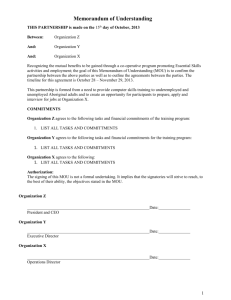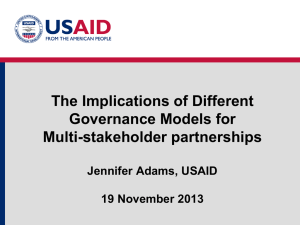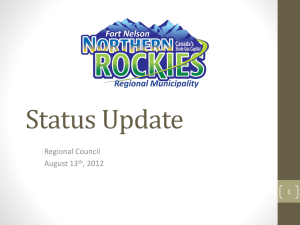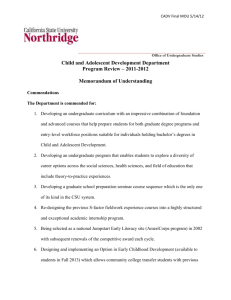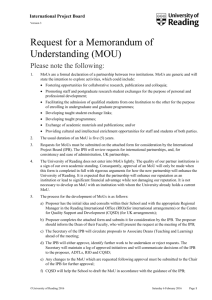Rdg Document Template - University of Reading
advertisement
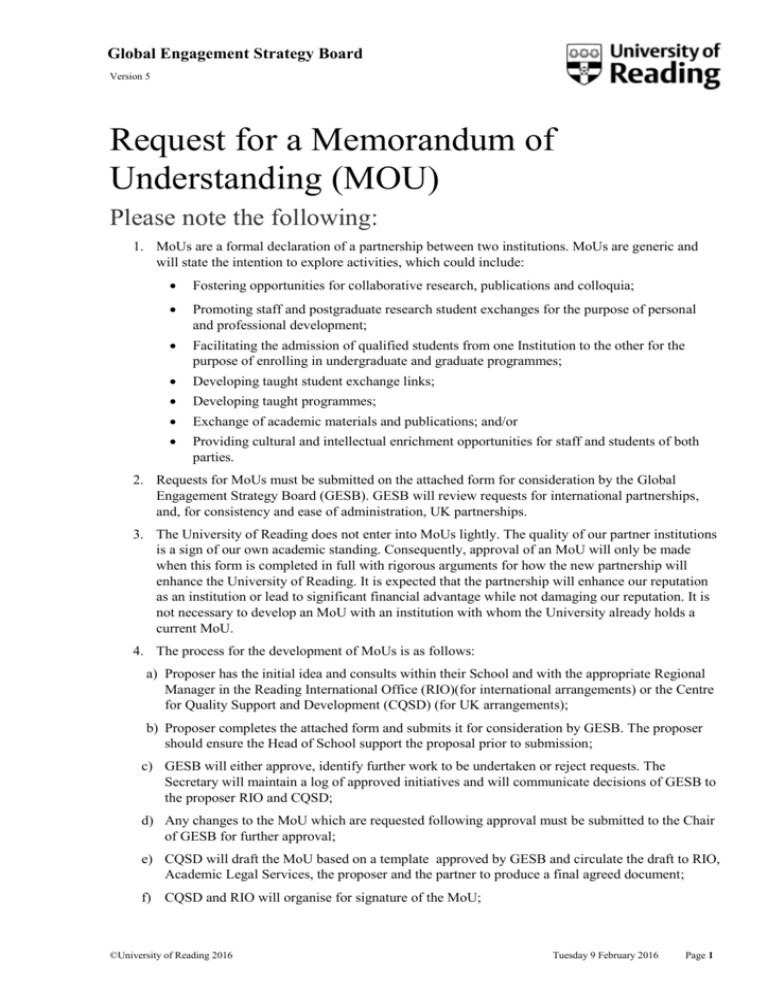
Global Engagement Strategy Board Version 5 Request for a Memorandum of Understanding (MOU) Please note the following: 1. MoUs are a formal declaration of a partnership between two institutions. MoUs are generic and will state the intention to explore activities, which could include: Fostering opportunities for collaborative research, publications and colloquia; Promoting staff and postgraduate research student exchanges for the purpose of personal and professional development; Facilitating the admission of qualified students from one Institution to the other for the purpose of enrolling in undergraduate and graduate programmes; Developing taught student exchange links; Developing taught programmes; Exchange of academic materials and publications; and/or Providing cultural and intellectual enrichment opportunities for staff and students of both parties. 2. Requests for MoUs must be submitted on the attached form for consideration by the Global Engagement Strategy Board (GESB). GESB will review requests for international partnerships, and, for consistency and ease of administration, UK partnerships. 3. The University of Reading does not enter into MoUs lightly. The quality of our partner institutions is a sign of our own academic standing. Consequently, approval of an MoU will only be made when this form is completed in full with rigorous arguments for how the new partnership will enhance the University of Reading. It is expected that the partnership will enhance our reputation as an institution or lead to significant financial advantage while not damaging our reputation. It is not necessary to develop an MoU with an institution with whom the University already holds a current MoU. 4. The process for the development of MoUs is as follows: a) Proposer has the initial idea and consults within their School and with the appropriate Regional Manager in the Reading International Office (RIO)(for international arrangements) or the Centre for Quality Support and Development (CQSD) (for UK arrangements); b) Proposer completes the attached form and submits it for consideration by GESB. The proposer should ensure the Head of School support the proposal prior to submission; c) GESB will either approve, identify further work to be undertaken or reject requests. The Secretary will maintain a log of approved initiatives and will communicate decisions of GESB to the proposer RIO and CQSD; d) Any changes to the MoU which are requested following approval must be submitted to the Chair of GESB for further approval; e) CQSD will draft the MoU based on a template approved by GESB and circulate the draft to RIO, Academic Legal Services, the proposer and the partner to produce a final agreed document; f) CQSD and RIO will organise for signature of the MoU; ©University of Reading 2016 Tuesday 9 February 2016 Page 1 Request for a Memorandum of Understanding (MoU) g) The signed copy of the MoU will be held by the CQSD and a list of MoUs will be maintained on the Internationalisation Blackboard website; h) The University will be review MoUs on a regular basis through the Partnership annual review (Form A) which is submitted to GESB annually. The template can be found here; http://www.reading.ac.uk/nmsruntime/saveasdialog.aspx?lID=86523&sID=87193 5. The University of Reading signatory on the MoU will be the Vice-Chancellor, who may delegate this to a Pro-Vice- Chancellor. The signatory of the partner institution will be of equivalent standing. 6. MoUs are expected to lead to agreements about specific activities which are signed as separate documents known as Memoranda of Agreement (MoA) between two institutions; in order for an MoA to be developed, an MoU should already be in place with the proposed partner. Typical activities covered by MoAs include teaching partnerships, progression agreements, staff and student exchanges, joint research projects and so forth. MoAs will be developed through a separate process; please contact Georgina Randall in CQSD (g.m.randall@reading.ac.uk) for further details. 7. Recruitment agreements established with partner institutions are expressed as separate contracts, for example: 4+1 arrangements, whereby students from partner institutions can enter designated UoR masters programmes subject to normal entry requirements ‘Double’ Masters agreements, whereby students from partner institutions enter designated UoR Masters programmes, subject to normal entry requirements, and also complete a Masters programmes at their home institution, resulting in gaining two separate Masters awards CQSD draft these contracts. The contents of such contracts must be approved by the Head of School and signed off on a cover sheet, also provided by CQSD. The cover sheet must accompany final versions of the annexes that are sent to the PVC Global Engagement for signature. 8. Copies of signed MoUs and MoAs must be deposited with the CQSD. 9. The usual duration of an MoU is five (5) years. In the year preceding the expiration of an MoU, the proposing School and RIO will consider if they wish to renew the partnership and the MoU. It should be noted that any annexes will require an in-date MoU to be in place for the recruitment arrangement to operate. To request the renewal of an MoU, proposers should complete the form below completing all questions with particular reference to 3.5 and 3.6. ©University of Reading 2016 Tuesday, 09 February 2016 Page 2 Request for a Memorandum of Understanding (MoU) Regarding types of MoUs You are asked to indicate which type of MoU you are requesting. GEBS acknowledges that MoUs are not static relationships, but this information helps to guide the Board in making initial decisions concerning MoU requests. Please therefore consult the following table in relation to question 1.6: Type Description Profile raising The institution or a subject area is highly regarded and ranked for the country, region and there are overlaps in several subject areas that offers cross-schools, cross-faculty collaboration opportunities or/and that offer collaboration opportunities for several activities such as research and teaching collaboration Recruitment led The institution is an accredited institution (not always highly ranked as often they are in need of building their capacity) and interested in sending staff or students for a full degree, advanced entry, study abroad or tailored made programmes on a fee paying basis. The institution would in most cases expect some fee discount. Research collaboration led The institution is a well-regarded institution and the main driver of the relationship starts as a research led collaboration which could then lead to other activities Student mobility led The institution has a strong reputation and good facilities and services and there is an intention for mutual exchanges of students for specified periods of time on a fee-waiver basis. Areas of risk to consider in relation to an MoU The MoU request form requires that an assessment is made of the risk to the University of entering into the relationship proposed. This will vary to a certain extent what is on the horizon in terms of future activities but some concerns will impact on the most basic interactions. Student/staff language Are the students taught in English or have English language levels that mean they would benefit from a partnership with an English language institution like Reading? The same issue applies to staff but needs to be considered in terms of both their English language abilities and potentially our staff’s foreign language abilities. If the relationship is based around a single Reading staff member who speaks the relevant language how does this impact on the sustainability of the relationship. Cultural and educational context Is the cultural and educational context one with which we are familiar or has commonalities with the UK (i.e. European, Australian etc.). How do qualifications and academic standards relate to our own? Partner’s status Are they a full University (taught and research degrees), a Polytechnic (taught degrees), a publicly funded college or research institute, or a private college or organisation? How does this status impact on any future areas of collaboration in terms of sustainability, quality assurance and local regulation? ©University of Reading 2016 Tuesday, 09 February 2016 Page 3 Request for a Memorandum of Understanding (MoU) Partner’s financial stability What is the ownership structure for the partner? Are they backed by national/regional local government? Do they produce annual financial statements? Are they publicly available? Does the partner trade for profit? If so, have they made profits in the last five financial years? Is their annual income greater than £150m? If not, is annual income growing or falling? Are their net assets greater than £100m? If not, are net assets growing or falling? Does the partner have significant levels of cash reserves (more than the equivalent of there months income)? If not, what cash reserves do they have? Compatibility Is the proposed partner a good match? Do we have overlap in several subject areas or just one? Are they of similar standing to us? Political and social context What is the local political and social context? How is the country regarded in relation to human rights and equality of opportunity? Is it politically stable? Health and safety Is it safe to travel to the partner? What risks and hazards are there in the country or locality? What safety standards are employed in facilities that staff/students might be using? Context Is there an existing MoU with a similar institution, or an institution in the local area? Is there likely therefore to be competition between any new and previously existing partner institution? How might such a conflict be managed? ©University of Reading 2016 Tuesday, 09 February 2016 Page 4 Request for a Memorandum of Understanding (MoU) Request for a Memorandum of Understanding (MOU) 1. MoU details 1.1 Name of person submitting 1.2 Email of person submitting 1.3 Name of School 1.4 Name of Proposed Partner Institution 1.5 Address of Proposed Partner 1.6 Name and contact details of key person(s) within the Proposed Partner Institution responsible for the MoU 1.7 What type of agreement are you seeking? (please circle/indicate as appropriate using the guidance above) Profile raising Recruitment led Research collaboration led Student mobility led 1.8 When do you wish the MoU to be approved and signed? (Note: it is unwise to invest significant time in developing activities with the proposed partner until the MoU has been approved and signed) 1.9 If different to 1.1, name of person responsible for building and reviewing the relationship with the Proposed Partner Institution once the MoU has been signed 2. Activity 2.1 Provide a summary of the activity to be undertaken by this arrangement 3. Partner ©University of Reading 2016 Tuesday, 09 February 2016 Page 5 Request for a Memorandum of Understanding (MoU) 3.1 Provide a summary of the proposed partner institution, specifying measures of its academic standing (such as position in league tables, awards). Please also state the names of other institutions with which it may already have partnerships. The Regional Manager with RIO for the relevant region (for international partnerships) or the Quality Support Office (for UK partnerships) will be able to help prepare this statement. 3.2 Provide a summary of existing links with the Proposed Partner Institution (e.g. our alumni, visiting staff, joint research projects). Again, you may need to draw on information from the Regional Manager or CQSD 3.3 Why do you wish to have a MoU with this proposed partner? Please explain what advantages this will bring to the University of Reading, including what MoAs are expected to follow. 3.4 What risks are there to the University of Reading by entering into a partnership with this institution? (Please consult the guidance provided to answer this question fully) For renewals only 3.5 What have been the key achievements of the existing MoU with the partner? 3.6 What are the plans for the coming years with this partner? I confirm that the above information is correct and that my School approves the formation of a partnership with the named institution. I have consulted the Head of School who supports this proposal. Head of School Signature: (electronic signatures are acceptable) ©University of Reading 2016 Date: Tuesday, 09 February 2016 Page 6 Request for a Memorandum of Understanding (MoU) Print Name: PLEASE SUBMIT THIS FORM BY EMAIL TO Sue Jones, s.w.jones@reading.ac.uk ©University of Reading 2016 Tuesday, 09 February 2016 Page 7
